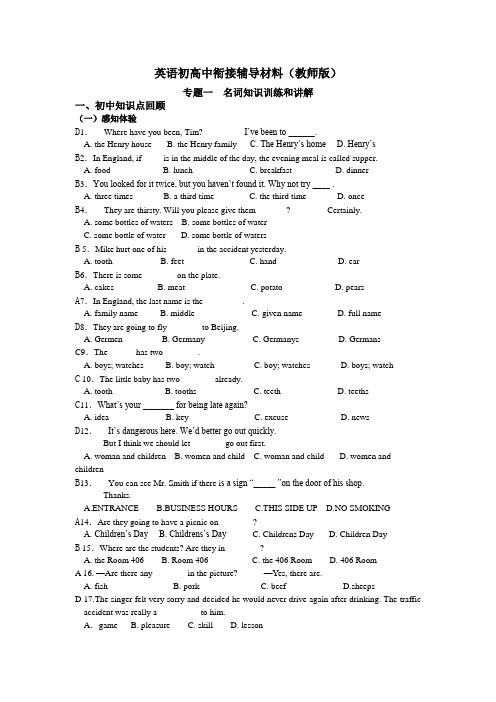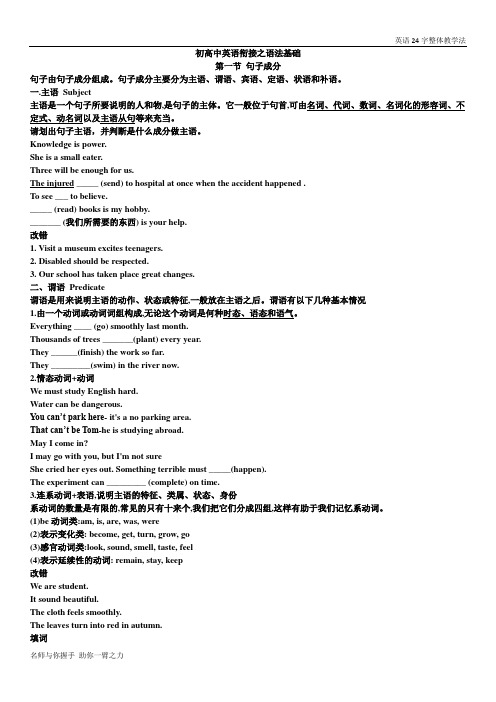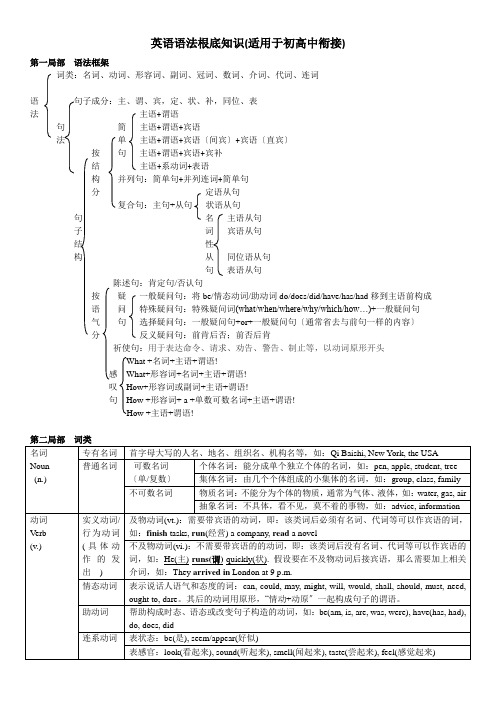初高中英语衔接知识1
初中升高中英语学习衔接

初高中英语学习如何过度高中与初中英语在学习内容及学习策略上有很大不同,如果做不好规划,成绩可能会滑下来,所以不要说我在初中英语成绩如何如何.....这些不同点具体表现在哪些方面(aspects),我们又该如何做好学习规划呢(How to do and what to do)?1、初次拿到课本就会发现高中英语课文学习板块和初中不一样,课文长了许多,单词多了许多。
2、和初中相比,高中英语老师上课更多使用英语讲课。
如果你的英语成绩还不错的话(中考能考110分左右),这个过渡期还好过一点。
如果是中等的话,一定要做充分的准备。
比如一定做好课前预习,多听,多诵读3、考试题型有很大变化。
初中多注重语言知识的综合运用,高中多注重能力提升。
一、词汇学习策略现行的初中英语新教材中必背词汇有1600个,高中必备词汇3500个,每个单元的词汇量可能是初中的3倍,所以在单词学习方法上也要有变化。
记单词千万不要死记硬背,我们可以从以下几方面入手:1.掌握英语词汇的构成规律英语单词的数量虽然庞大,但构成单词的元素----词根、前缀和后缀等却是有限的,比如:agree-agreement-disagree-disagreement,re表示重复,read-reread如果能熟练地掌握这些单词的基本构件,并对单词进行分析和记忆,则会增强词汇的记忆效果。
因此,我们要学会找出单词的联系,降低词汇记忆的难度,提高词汇学习的效率。
2.学会对单词进行深加工英语单词的识记过程就是信息的储存和检索的过程,要对一个生词进行全面加工,即单词的发音、拼写、语法范畴、语境意义及其横纵合关系等,而不是加工其中的一个或两方面,对英语单词进行语义加工会激活和利用原有知识,并能提供更多的检索路线,因而有利于深层记忆。
比如:“capture”这个词,在以下三个语境中意思相差很远。
(1) The thief has not been captured yet.目前窃贼尚未抓获。
初高中英语衔接专题

初高中衔接练习I. Multiple choicesPart 1 11. Tom and Linda are ______ from Australia. A. students B. girls C. boys D. sisters12. There is a lot of traffic in this city, ______ look both ways before crossing the street.A. soB. andC. butD. for13. The world is becoming smaller and smaller because the Internet brings us ______.A. the closeB. closerC. the closerD. close14. –Hello! I haven’t seen you for years. --Oh, John ______?A. How are youB. How do you doC. How about youD. What are you15. Please pay your attention to your spelling. You’ve dropped ______ “d” in the word Wednesday.A. anB. theC. aD. /16. –By the way, do you know the National Spelling Bee? --No, I’ve never heard of it. Tell me ______, please.A. what is itB. what it isC. it is whatD. is it what17. Believe it or not, more than half of your body weight ______ water.A. comes acrossB. comes fromC. comes byD. comes to18. ______ the help of the Internet, we can learn what other people around the world are doing.A. ByB. ThroughC. WithD. For19. We won’t go sightseeing if ______ tomorrow.A. it rainsB. it will rainC. it would rainD. it rained20. Tom ______ a lot of friends since he came to China last year.A. madeB. makesC. is makingD. has made21. –How many students are there in your newly-built school? --Two thousand in ______ classrooms.A. fourB. fourthC. fortyD. the fortieth22. Alice has been in China for several years. She ______ be a big girl now.A. needB. mustC. canD. may23. I think high school students should not ______ pocket money.A. be givingB. have givenC. giveD. be given24. Miss Green is the only person ______ can help you with your English.A. sheB. whomC. whichD. who25. –Lucy, let me help you fix your computer. --______. I can manage it myself.A. That’s OKB. No, thanksC. Perhaps notD. Not at allPart 2 11. --______ is that man over there? --That’s my brother.A. WhoB. WhatC. WhereD. How12. –Do you enjoy your stay in Hangzhou? --Yes. I’ve had ______ wonderful time.A. /B. aC. theD. an13. Shark is getting old and cannot jump as ______ as he did.A. highB. higherC. highestD. much higher14. –Will you watch the World Cup match this year?--No, but I ______ several World Cup matches since I was a small child.A. had seenB. seeC. was seeingD. have seen15. English ______ in Canada, Australia and New Zealand as well as America and Britain.A. speaksB. is speakingC. is spokenD. spoke16. –Where is mom now? --I’m not sure. She ______ be in the kitchen.A. shallB. mayC. needD. must17. Ted’s mother kept telling Ted not to tell lies, but ______ didn’t help.A. whichB. itC. sheD. he18. I usually go to school ______ bike, but sometimes I go to school ______ foot.A. with; onB. on; byC. on; withD. by; on19. There are about two ______ students in the newly built school.A. thousandB. thousandsC. thousand ofD. thousands of20. –Why didn’t Alice come to the party last night? --I don’t know ______.A. why didn’t sheB. why she didn’tC. why did sheD. why she did21. Please ______ the lights when you leave the classroom.A. turn inB. turn upC. turn offD. turn out22. Beth has a beautiful ______. Listen! She is singing very well.A. voiceB. lookC. soundD. smell23. There are some dangerous fishes in this river, and I’ve warned Jack ______ here.A. not to swimB. to not swimC. swim not toD. to swim not24. She worked so quietly ______ no one knew she was there.A. whichB. afterC. asD. that25. –What a nice day! Let’s go for a picnic on the beach together. --______.A. GoodbyeB. Good ideaC. Good jobD. Good dayPart 31.All pilots must ____ the passengers safety.A. be responsible forB. be responsible toC. respond forD. respond to2.“ Is there ____ here?” Mary entered the room and shouted.A. anybodyB. somebodyC. somethingD. anything3.______ Chinese, we study English , maths, physics in school.A. ExceptB. BesidesC. BesideD. Without4.If it is true, it _____ interesting questions.A. raisedB. roseC. raisesD. rises5.The two _____ found their luggage in the end.A. GermanB. GermenC. GermansD. Germany6.Is a human brain a more powerful ____ than a computer?A. calculateB. calculationC. calculatingD. calculator7.His father as well as us _____ his work.A. are pleased withB. is pleased withC. are pleased ofD. is pleased for8.– Which of the two English dictionaries will you buy?– I will buy _____ of them , so I can give one to my friend, Helen.A. eitherB. neitherC. bothD. all9.The students of Class Three have already finished the ____ lessons.A. twenty –fifthB. twenty-ninethC. 23thD. twentieth-six10.Everybody in Troy went to sleep _____ the guards.A. includeB. includesC. includingD. included11.Because of his poor health, his dream of becoming a basketball player could not be realized.A. come trueB. be recognizedC. be rememberedD. be recalled12.The boy ______ the spelling mistake.A. aware ofB. was unaware ofC. is unawareD. unaware of13.Everybody should _____ the environment ____ pollution.A. prevent…fromB. protect…fromC. stop…fromD. keep…from14.The kind old lady ____ the poor dog as I he were her son.A. looked afterB. looked forward toC. looked forD. looked through15.Chris is a _____. The police think he killed the old man and are trying to catch him.A. suspectB. criminalC. detectiveD. guilty16.The famous detective told me about a(n) _____he dealt with last moth.A. storyB. actionC. adventureD. case17. The antique shop sometimes sells fakes. They ______ customers from time to times.A. sellB. cheatC. attackD. purchase18.If you _____ a crime, you must expect to be punished by law.A. watchB. commitC. makeD. find19.A young man in black ____ Mrs White’s bracelet last week.A. robbed ofB. robbedC. stoleD. stole of20.Doris _____ for six years.A. was in prisonB. put into jailC. was sent into prisonD. went into jailII. 完形填空When I was three years old just before my sister was born, my mom asked me what we should name the new baby. I said, “Let’s call 26 Gravy(肉汁)!”You know, we pour gravy over meat and it tastes good! My parents found my 27 interesting, but named the new baby Caroline, instead.Having a sister 28 my life. When my sister and I played together, we 29 got into fights and got angry with each other if we did 30 wrong. It sometimes drove our parents crazy. 31 at the same time, we learned to share our things and to forgive(原谅) each other when we got 32 .In North America, there are many kinds of families, but 33 families have a boy and a girl. Of course, some have three or more. In China, most children 34 have brothers or sisters, and they have to learn those things in other ways, which is more 35 .When I 36 away to university, my sister 37 me she wished I still lived at 38 . She wasn’t used to getting all the attention from my parents. But Chinese children get all the attention for all their life!Some middle school 39 in China wish they had a brother or sister. If you are one of them, I 40 a good idea for you. Treat your friends and classmates as your brothers and sisters!26. A. her B. him C. me D. them27. A. news B. idea C. lesson D. story28. A. began B. saw C. changed D. enjoyed29. A. never B. again C. seldom D. often30. A. something B. everything C. anything D. nothing31. A. But B. So C. Or D. Through32. A. angry B. excited C. hungry D. worried33. A. few B. several C. all D. most34. A. shouldn’t B. don’t C. needn’t D. wouldn’t35. A. beautiful B. difficult C. careful D. friendly36. A. took B. put C. moved D. came37. A. asked B. answered C. told D. warned38. A. home B. work C. school D. family39. A. students B. teachers C. workers D. lovers40. A. give B. have f C. learn D. makeIII. 阅读理解A) I have never taken cooking classes. I learned cooking from my mother because she was really interested in teaching me how to cook. The main reason for this was because when my mother got married, she didn’t know how to cook anything, not even an egg. My grandmother never allowed her to stay in the kitchen when she was cooking.My mother did not start to cook until she was 25 years old. In the beginning, it was very hard for her. Therefore, she had to take cooking classes to prepare our meals. After having that experience, she decided to teach me how to cook because she didn’t want me to have the same experience.I remember when I was seven years old, and my other was cooking, I was with her in the kitchen enjoying cooking.I always helped her. Sometimes we prepared meals that my mother already knew how to make, and sometimes we prepared them from recipes. Nowadays, I am really thankful for that experience because I don’t need help to cook a meal.I can cook for me alone or for a group of people; it doesn’t matter.I will do the same with my children because I don’t want them to have the same experience as my mother. If one day I am not with them, I want to be sure that they can carry on their lives without me.41. The writer’s mother learned cooking ______.A. from the writer’s grandmotherB. all by herselfC. by taking cooking classD. from cooking books42. The writer’s mother taught the writer how to cook because ______.A. she wanted the writer to be more independent(独立)B. the writer was interested in cookingC. she thought it a must for a woman to learnD. she needed more help when she was cooking43. The underlined work “recipes” in this passage most probably means ______.A. instructions on how to prepare foodB. experiences of cooking foodC. some well-known cooksD. tools for cooking and heating food44. We can learn from the passage that the writer’s children will ______.A. hate cookingB. learn cookingC. teach cookingD. forget cooking45. The writer must think cooking is ______ to learn in life.A. interestingB. difficultC. enjoyableD. importantB) Banbury House Tel: 564839Enjoying mixing with other students in pleasant accommodation (住宿) 30 minutes from the station and close to all main bus routes. Single and double rooms. Students provide own food but all cleaning services offered. Please bring your own bed things.Three Seasons Tel: 445987We can provide all types of accommodation for all types of single student. Rooms are fully prepared with bed things and have reasonable prices. Full board possible. 35—40 minutes from main universities and the city.Sturtin Hostel Tel: 876333We offer beautiful views. It lies in pleasant countryside. Relax after a long day by swimming in the pool or using the exercise gym. Separate study rooms available. No children. Bar & restaurant.First Shop Tel: 223300Ideal for new students, we provide double rooms. If you wish, we can offer help in finding a suitable person to share a room with. All washing and cleaning services offered at extra charge. Large canteen and three bathrooms on each floor.46. Which number would you ring if you are interested in sports?A. 564829B. 445987C. 876333D. 22330047. ______ offers help in finding a room-mate.A. Banbury HouseB. Three SeasonsC. Sturtin HostelD. First Shop48. If you live in Banbury House, you have to ______.A. do cooking by yourselfB. do cleaning by yourselfC. travel by trainD. take a school bus49. The articles above are mainly for ______.A. family accommodationB. student accommodationC. travel accommodationD. cheap accommodation50. The four texts above are most probably ______.A. lettersB. noticesC. invitationsD. advertisementsC) Many years ago when people had no thermometers(温度计), they usually touched a thing to see how hot or cold it was. The following experiment shows easy it was to make a mistake.Take three glasses: the first one with very hot water, the second one with very cold water, and the third one with water at room temperature. Then you put a finger of one hand in the hot water, and a finger of the other hand in the cold water. You hold your fingers in the two glasses for a That is minute. Then you use each finger, one after another, one after another, to see how hot or cold the water in the third glass is. You will find that the water is warm to the finger that was in the cold water before, but the finger which was in the hot water will feel cold in the same glass of water.That is why you must always find the temperature in a scientific way. You must not try to tell the temperature as it seems to you.You will often make a mistake if you take something that seems to you for a real fact. For example, when you are going to an Amusement park by bus and you want to get there very quickly, it seems to you that your bus is going very slowly, slower than the other buses. But if it is Sunday and you have much free time, it seems to you all the buses and cars are going very fast.51. The experiment tells us that sometimes it is ______ to make a mistake.A. interestingB. difficultC. easyD. helpful52. The water in the third glass is ______.A. colder than the water in the first glassB. hotter than the water in the first glassC. colder than the water in the second glassD. as cold as the water in the second glass53. What will you find if you put the finger which was in the first glass into the second glass according to theexperiment?A. The water is hotter than it is in the first glass.B. The water is as hot as it is in the first glass.C. The water is at room temperature.D. The water is colder than it is in the first glass.54. How should we find the temperature according to the passage?A. Try to tell as it seems to us.B. Try to use our fingers.C. Try to tell in a scientific way.D. Try to touch something to see how hot it is.55. We can learn something about ______ from the passage.A. physicsB. chemistryC. psychology(心理学)D. biology(生物学)IV56a meal. Today, fast food is 57 cheap, which makes it even more attractive. And it is everywhere—not only in the United States 58 around the world. Now, 59 , there is a group of people who would like to see us stop 60 so much fast food. These people belong to the Slow Food Movement.The Slow Food Movement started in Italy in 1986. It was 61 by Carlo Petrini, a food critic who 62 owned a restaurant. He and his friends wanted to encourage more people to slow 63 and learn to prepare and enjoy good food again. 64 began by meeting in small 65 to organize dinners and wine tastings. They also began to encourage 66 local farmers to go back to the old ways of growing food and caring for farm animals. They felt that food that was raised carefully tasted 67 .This small Italian group grew, 68 in 1989 the International Slow Food Movement was born in Paris. Today there 69 78,000 members in 100 countries. There is also a 70 magazine, printed in six languages, including Japanese.V. 短文改错Cell phones can be see almost everywhere in 71. ________school now. Many teacher say that we students 72. ________should not use cell phones at school. But I think 73. ________it should be allowed to use at school because 74. ________we want to get touch with our parents. Cell 75. ________phones can be used almost anywhere or at any 76. ________time. What more, cell phones can be great fun, 77. ________too. Besides make phone calls, we can also play 78. ________games and sent text messages to our friends by 79. ________cell phone. Don’t you think of they are necessary? 80. ________VI. 书面表达假如你刚去澳大利亚的一所高中读书,在上第一节课时,你填(打勾)了一张表格(见听力测试第二大题)。
初高中英语衔接

初高中英语衔接(一)第一讲语音一、Letters 字母Aa Bb Cc Dd Ee Ff Gg[e i] [bi:] [s i:] [di:] [i:] [ef] [dʒi:]Hh Ii Jj Kk Ll Mm Nn[eitʃ] [ai] [dʒei] [kei] [el] [em] [en]Oo Pp Qq Rr Ss Tt[əu] [pi:] [kju:] [a:] [es] [ti:]Uu Vv Ww Xx Yy Zz[ju:] [vi:] [‘dʌblju:] [eks] [wai] [zed]二、International Phonetic Alphabet 国际音标元音因素20个发音时声带振动,气流在通过口腔时不受发音器官阻碍的音素叫元音元音20个单元音(12个)前元音:[i:] [ i ] [e ] [æ]中元音:[ ə:] [ ə ] [ ʌ ]后元音:[ a: ] [ ɔ:] [ ɔ ] [u:] [u]双元音(8个) 合口双元音:[ei ] [ ai ] [ ɔi ] [ əu ] [ au ]集中双元音:[ iə ] [εə ] [ uə]辅音因素28个发音时气流在通过口腔时受到发音器官的阻碍而发出的音素叫辅音。
其中声带振动的叫浊辅音,声带不震动的叫清辅音轻辅音/p/ / t/ / k/ /f/ /θ/ /s/浊辅音/b/ /d/ /g/ /v/ /ð/ /z/轻辅音/ts/ /ʃ/ /tʃ/ /tr/ / h/浊辅音/dz/ /ʒ/ /dʒ/ /dr/ /r/鼻音/m/ /n/ /ŋ/半元音/w/ /j/ 舌边音/ǀ/语音的基本常识1、音节的划分一个单词的音标中有几个元音就有几个音节。
2、重读音节任何双音节或多音节单词的音标中,有重读音节和非重读音节,哪一个音节重读,该音节的左上方或该音节的元音上方标有重读符号“'”。
3、浊化音以sp__, st___, sk___开头的单词中,清辅音/p/ /t/ /k/分别要发浊辅音/b/ /d/ /g/。
句子成分和基本的句型结构讲义初高中英语衔接课程

语法精讲:句子成分和基本句子结构知识点1 句子成分句子是表达思想的基本单位,主要句子成分(sentence elements)有主语(S)、谓语(V)、宾语(0)、补语(C)、状语(A)、表语(P)、定语(Attr.)等。
具体如下:1.主语(subject):表示句子所要说明或描述的人或事物,一般由名词、代词或相当于名词的词组或句子充当,置于句首。
如:The students are listening to me carefully. They want to learn English well. Learning English well isn't as hard as you think.学生们在认真听我讲课。
他们想学好英语,学好英语不像你想的那么难。
2.谓语(verb):说明或描述主语的动作、状态或特征,由动词或动词短语充当,位于主语之后。
如:He runs every morning.他每天早上跑步。
You may keep the book for two weeks.这本书你可以借两周。
The students are playing basketball on the playground.学生们正在操场上打篮球。
The film is interesting.这部电影很有趣。
3.宾语(object):指动作所涉及的人或事物。
一般由名词、代词或相当于名词的词组或句子充当,位于动词或介词之后。
有的动词后面可以接两个宾语,通常把其中表示人的宾语称为间接宾语(indirect object),把表示物的宾语称为直接宾语(direct object)。
如:He is going to buy a dictionary.他打算买本词典。
(动词的宾语)We should learn from him.我们应向他学习。
(介词的宾语)Lend me your book,please.请把你的书借给我。
我的初高中衔接-----英语语法词类词性句型

初高中衔接——英语语法一、十大词类1.名词:表示人或事物的名称。
2.动词:表示动作或状态。
3.形容词:表示人或事物的性质或状态。
4.数词:表示数目或顺序。
5.代词:代替名词或数词等。
6.副词:表示动作特征或性状特征。
7.冠词:表示名词的泛指或特指。
8.介词:表示名词或代词与其他词的关系。
9.连词:表示连接并列成分的词。
10.感叹词:表示说话时的感情或口气。
二、八大句子成分要弄清楚英语句子的结构,我们先要弄清楚组成一个句子的各个组成部分,即句子的成分:句子的主干成分:主语、谓语、宾语、表语、补语 句子的次要成分:定语、状语、插入语、同位语1、主语:(1)是一个句子所要说明的人和事物,(2)表示句子说的是什么人或什么事,(3)是一句的主体;(4)一般位于句首,但在there be 、疑问句(主语不是疑问词)、倒装句中,主语在谓语动词、助动词、情态动词之后。
主语可以用以下这些表示: 1. 名词;2. 代词; 3. 数词;4. 动名词;5. 不定式; 6. 词组或复合结构;7. 从句;8. 名词化的其他词类。
eg:1) A foreign language is a weapon in the struggle of life. 2) Who is speaking, please? This is Jack speaking. 3) Two will be enough.4) Smoking is very dangerous. 5) To see is to believe.6) Whether we’ll go depends on the weather. 7) “A” is an article.2、谓语:①它是说明主语的动作或状态的,说明主语做什么、怎么做;②作谓语的常有:及物动词或及物动词短语; 简单谓语:由一个动词(短语)构成 ③ A.情动/助动+动原 复合谓语:B.系动词+表语1) The soup tastes good 2) The boy is interested in playing PC games. 3) The boss made the workers work long hours.4) He practises playing the piano every day. 5) They had finished the job when the boss came 6) Record every word you hear. 7) He didn’t turn to me for help.*在英语简单句中,只能有而且(一般情况下)必须有一个谓语部分!3、宾语:(1)它是表示及物动词或及物动词短语所作用的对象的(动宾),如 I studyEnglish 中的English 和He makes full use of his spare time to study 中的his动词的分类情态动词 助动词 系动词实义动词及物动词不及物动词spare time.(2)介词后的名词或代词,叫做介词的宾语(介宾),如He went away with no words中的no words. (3)一般位于及物动词或介词之后。
英语初高中衔接辅导材料(教师版)专题一 名词

英语初高中衔接辅导材料(教师版)专题一名词知识训练和讲解一、初中知识点回顾(一)感知体验D1.--- Where have you been, Tim? --- I’ve been to ______.A. the Henry houseB. the Henry familyC. The Henry’s homeD. Henry’sB2.In England, if ____ is in the middle of the day, the evening meal is called supper.A. foodB. lunchC. breakfastD. dinnerB3.You looked for it twice, but you haven’t found it. Why not try ____ .A. three timesB. a third timeC. the third timeD. onceB4.--- They are thirsty. Will you please give them ______ ? --- Certainly.A. some bottles of watersB. some bottles of waterC. some bottle of waterD. some bottle of watersB 5.Mike hurt one of his ______ in the accident yesterday.A. toothB. feetC. handD. earB6.There is some _______ on the plate.A. cakesB. meatC. potatoD. pearsA7.In England, the last name is the _______ .A. family nameB. middleC. given nameD. full nameD8.They are going to fly _______ to Beijing.A. GermenB. GermanyC. GermanysD. GermansC9.The______ has two _______ .A. boys; watchesB. boy; watchC. boy; watchesD. boys; watchC 10.The little baby has two _______ already.A. toothB. toothsC. teethD. teethsC11.What’s your _______ for being late again?A. ideaB. keyC. excuseD. newsD12.--- It’s dangerous here. We’d better go out quickly.--- But I think we should let _______ go out first.A. woman and childrenB. women and childC. woman and childD. women and childrenB13.--- You can see Mr. Smith if there i s a sign “_____ ”on the door of his shop.--- Thanks.A.ENTRANCEB.BUSINESS HOURSC.THIS SIDE UPD.NO SMOKINGA14.Are they going to have a picnic on _______ ?A. Children’s DayB. Childrens’s DayC. Childrens DayD. Children DayB 15.Where are the students? Are they in _______ ?A. the Room 406B. Room 406C. the 406 RoomD. 406 RoomA 16. —Are there any _______ in the picture? —Yes, there are.A. fishB. porkC. beefD.sheepsD 17.The singer felt very sorry and decided he would never drive again after drinking. The traffic accident was really a _________ to him.A.game B. pleasure C. skill D. lessonC18. — Would you please pass me something to drink?— What about some ______?A. beefB. fishC. juiceD. breadB 19. —Excuse me. may 1 know your_______?— Sure. It's No. 3. Bridge Street.A. houseB. addressC. wayD. placeC 20. _______ about the sports meeting make us excited.A. NewsB. InformationC. MessagesD. AdviceA 21. Can you imagine what life will be like in ______ time?A. 50 years’B. 50 year’sC. 50-years’D. 50-yearsD22. The old man used to raise many _____ to make a living on the farm.A.duckB. horseC.birdD.sheepA 23. Please pick up the ____. Don’t keep it on the floor.A. paperB. boxesC. booksD. bottles16-20 21-25D 24. —Could you please tell me something about the two_ ?—____. They arc exchange students of No. 1 Middle School.A. Frenchmen; Yes, pleaseB. Frenchmans; Come onC. Germen; Not at allD. Germans; All rightD 25.—How many teachers are there in your school? —them over two hundred.A. woman; The number of; isB. women; The number of; isC. woman; A number of; isD. women; A number of; are(二)归纳讲解1、名词的种类专有名词London, John, the Communist Party of China普通名词nurse, boy, worker, pencil, dog, table集体名词class, family, army, police, team, people物质名词water, steel, glass, cotton, wood, sand抽象名词happiness, love, work, life, courage, honest2、名词的句法功能主语My family is now in New York.表语His father is a scientist.宾语We love our great motherland.宾语补足语He made London the base for his work.定语The girls are making paper flowesrs.状语The car cost him 1000 dollars.同位语Mr Brown, a famous scientist, will come here.3、名词的数(1).可数名词有单数和复数两种形式。
初升高英语衔接语法部分---句子成份,简单句,并列句,复合句

初高中英语衔接之语法基础第一节句子成分句子由句子成分组成。
句子成分主要分为主语、谓语、宾语、定语、状语和补语。
一.主语Subject主语是一个句子所要说明的人和物,是句子的主体。
它一般位于句首,可由名词、代词、数词、名词化的形容词、不定式、动名词以及主语从句等来充当。
请划出句子主语,并判断是什么成分做主语。
Knowledge is power.She is a small eater.Three will be enough for us.The injured _____ (send) to hospital at once when the accident happened .To see ___ to believe._____ (read) books is my hobby._______ (我们所需要的东西) is your help.改错1. Visit a museum excites teenagers.2. Disabled should be respected.3. Our school has taken place great changes.二、谓语Predicate谓语是用来说明主语的动作、状态或特征,一般放在主语之后。
谓语有以下几种基本情况1.由一个动词或动词词组构成,无论这个动词是何种时态、语态和语气。
Everything ____ (go) smoothly last month.Thousands of trees _______(plant) every year.They ______(finish) the work so far.They _________(swim) in the river now.2.情态动词+动词We must study English hard.Water can be dangerous.You can’t park here- it's a no parking area.That can’t be Tom-he is studying abroad.May I come in?I may go with you, but I'm not sureShe cried her eyes out. Something terrible must _____(happen).The experiment can _________ (complete) on time.3.连系动词+表语,说明主语的特征、类属、状态、身份系动词的数量是有限的,常见的只有十来个,我们把它们分成四组,这样有助于我们记忆系动词。
初高中英语衔接-句子成分

• 8. Lend me your dictionary, please.
• 9. They gave me some money. • 宾语:宾语表示动作的对象或承受者,一般位于及
物动词(vt.)和介词(prep.)后面。
a, an, the in, on, at, behind, from and, but, if, or
感叹 词
表示说话时的感情或口气 interj.
oh, er, ough, um,ouch
名称 英语名称
用途
例词
句法作用
名词 n.(noun)
表示人或事物 的名称
代词
pron. (pronoun)
词性和句子成分
预备知识点一:词类概述 十大词类:
根据英语单词所表达的含义以及在句子中的作用,把英 语单词分为10个类别,即: 名词、代词、数词、动词、副词、形容词、冠词、
介词、连词、感叹词。
根据部分词类具有的共同特征,又将十大词类分为两大 部分,即:实词和虚词
实词:名词、代词、数词、动词、副词、形容词。
6. The teaching plan for next term has been worked out.
7. He is reading an article about how to learn English.
• 定语:1.修饰名词或代词,起限定,具体说明的作用 • 2. 在汉语中常用“….的”来表示。
主 谓语
宾语
定语
2. My brother hasn't done his homework.
主语
初升高知识衔接【优质】PPT文档

5.定语修饰名词或代词,通常由形容词、代词、数词等担任。
这种要发而又不发出来的音就是我们所说的不完全 答案:to improve
(1)形容词→动词,如:dry(干燥的)→dry(弄干),clean(干净的)→clean(打扫,弄干净)等。
爆破音,这种发音现象叫做失去爆破。 →The film ________ ________ ________ ________ ten min划分 口诀:一在后,二分手 一在后:如果两个元音中有一个辅音,则把这个辅音的 发音划到后面。 二分手:如果两个元音中有两个辅音,则平分这两个辅 音的发音,前后各一个。 一般来说,一个单词的发音元音的总数决定了这个单词 所包含的音节数目,也就是说有几个元音音素就有几个 音节,如一个音节:I;a;six;girl;one;how 两个音节:fa/ther;re/move;peo/ple;ri/ver;rea/dy 三个音节: cen/tu/ry;vi/ta/min;cer/tain/ly
带有不完全爆破音的词或句子,听起来好像有些音 9.Justin Bieber’s first single,One Time,is about one of his favorite________(topic),puppy love.
并列句是由两个或多个简单句连接而成的。
元音有20个,分为____元音和____元音。
初高中知识链接
5.不同音节中元音字母的发音 (1)在闭音节中的元音字母一般发短元音,如: a/æ/cat;e/e/bed; i/I/big;o/ɒ/dog;u/ʌ/bus (2)在开音节中的元音字母一般发字母的名称音 绝对开音节:以发音的元音字母结尾。如:she/ʃi /; hi/haI/ 相对开音节:元辅e结构。如:lake/leIk/;like/laIk/; coke/kəʊk/
2019人教版新教材 初高中英语衔接学习材料 1-9 汇编

初高中英语衔接学习材料(1)一: 词汇积累1.Coffee of high quality(质量,品质) costs more than that of poor quality(质量,品质)..2.I felt as if my heart would burst(burst爆裂,突然发生) with joy.At the news , the mother burst into tears/burst out crying(大哭起来).3. Each year Americans consume (消费)a high percentage of the world's energy.4. It's rude to spit (spit吐痰,吐唾沫) in public.公众场合吐痰是粗鲁的.5. House values may begin to slide (滑, 溜). 房价可能开始逐渐下降了.The thief slid (slide—slid--slid滑, 溜)into the room.6. The high wind passed and the sea was calm(平静的) again. 大风过后,大海重又风平浪静。
Faced with difficulty, we should keep calm(冷静的).面对困难, 我们应该保持冷静..7. The family has settled(settle 定居) in Canada. 这家人已定居加拿大。
They settled(settle解决) their differences in a friendly way.他们以一种友好的方式解决了他们的分歧.8.My father suffers (suffer遭受)from high blood pressure. 我父亲有高血压。
.9. Do you like campus(校园) life?10. The doctor transplanted (transplant移植) skin to her face.11.Children should learn above all how to observe good manners at table. 小孩首先应学会餐桌礼仪。
超实用初高中英语衔接:核心单词课件

n.费用;花费v 花费
at the cost of 以...为代价
14.course / kɔːs /
n.当然;课程;过程
C 15.cover / ˈkʌvə(r) / v.遮盖 包含n. 覆盖物 be covered with 被...覆盖
16.cut down cut in cut off cut up
_带__来______ _归__还______ _出__版______ _教__育______ _引__起_______ _引__进_______
建立
C 1.care / keə(r) / n.照顾;照料 v. 在乎 2.catch / kætʃ / v.接住;抓住;得病;领会 3.change/ tʃeɪndʒ /n.变化 零钱;v. 改变 4.chance / tʃɑːns / n.机会 5.choice / tʃɔɪs / n.选择 6.clean / kliːn / v.把...弄干净 adj.干净的 7.close / kləʊz / v. 关闭 n.结束 adj. 亲密的 e / kʌm / v.来
二、课堂教学务必高效
课堂是教育教学是主阵地。高三年级教学时间紧,教学任务重,更要切实发挥课 堂40分钟的作用。一是上好微专题课。春节前后,一轮复习进入后期,学生不会 的知识点逐步浮出水面。这些薄弱知识点如果解决不好,将直接影响到二轮复习 的效果。高三年级要围绕浮现出来的问题,上好微专题或微微专题课,针对某一 个点或几个点精讲、讲透,触类旁通。微专题课怎么上?可以针对学生不会的问 题,每节课重点解决1-2个知识点,专题强调,专点训练,不贪多,顺一个点“追 祖宗八代”,剖析透!微微专题,则更精、更准、更小、更有效,可以一节课只讲 一道题,但是要把这一道题挖深、挖透,讲透一个会一类,做会一题能举一反三 。
英语语法基础知识(适用于初高中衔接)1

英语语法根底知识(适用于初高中衔接)第一局部语法框架词类:名词、动词、形容词、副词、冠词、数词、介词、代词、连词语句子成分:主、谓、宾,定、状、补,同位、表法主语+谓语句简主语+谓语+宾语法单主语+谓语+宾语〔间宾〕+宾语〔直宾〕按句主语+谓语+宾语+宾补结主语+系动词+表语构并列句:简单句+并列连词+简单句分定语从句复合句:主句+从句状语从句句名主语从句子词宾语从句结性构从同位语从句句表语从句陈述句:肯定句/否认句按疑一般疑问句:将be/情态动词/助动词do/does/did/have/has/had移到主语前构成语问特殊疑问句:特殊疑问词(what/when/where/why/which/how…)+一般疑问句气句选择疑问句:一般疑问句+or+一般疑问句〔通常省去与前句一样的内容〕分反义疑问句:前肯后否;前否后肯祈使句:用于表达命令、请求、劝告、警告、制止等,以动词原形开头What +名词+主语+谓语!感What+形容词+名词+主语+谓语!叹How+形容词或副词+主语+谓语!句How +形容词+ a +单数可数名词+主语+谓语!How +主语+谓语!第三局部句子成分及简单句一、简单句的五大根本句型:主语+ 谓语名词/代词/动名词/不定式+ 不及物动词主语+ 谓语+ 宾语名词/代词/动名词/不定式+ 及物动词+ 名词/代词/动名词/不定式主语+ 谓语+ 宾语〔间宾〕+ 宾语〔直宾〕名词/代词/动名词/不定式+ 及物动词+ 代词+ 名词主语+ 谓语+ 宾语+ 宾补名词/代词/动名词/不定式+ 及物动词+ 代词+ 代词/名词/数词/非谓语动词/副词/形容词/介词短语主语+ 系动词+ 表语名词/代词/动名词/不定式+ 系动词+ 代词+ 代词/名词/数词/非谓语动词/副词/形容词/介词短语实例依次如下:She arrived (on time). 主谓(状)她按时到了。
We will accept (their) invitation. 主谓(定)宾我们将承受他们的邀请。
初高中衔接英语背诵材料30篇

高中英语:初高中衔接英语背诵材料30篇l. A Young Officer and an Old Soldier (1)A very new, young officer was at a railway station He was going to visit his mother, and he wanted to telephone her to tell her the time of his train. He looked in all his pockets, but found that he did not have the coins for the telephone, so he went outside and looked around for someone to help him.1.年轻军官与老兵(1)一位新上任的(new)年轻军官(young officer)在火车站(railway station)候车。
他要去看望(visit)他的母亲(mother)。
他想打电话(want to telephone sb.)告诉(tell)母亲他的列车(train)到站的时间。
但寻遍了所有的口袋(pocket),却发现(find)他没有打电话用的硬币(coin),于是他走到车站外面(outside),环顾四周(look around)想找人帮忙(help)。
1. A Young Officer and an Old Soldier (2)At last an old soldier came by, and the young officer stopped him and said,“Have you got change for ten pence?”“Wait a moment,”the old soldier answered, beginning to put his hand in his pocket.“I'll see whether I can help you.”“Don't you know how to speak to an officer?”the young man said angrily.“Now let's start again Have you got change for ten pence?”“No, sir,”the old soldier answered quickly.1.年轻军官与老兵(2)最后(at last)有名老兵(old soldier)路过,年轻的军官拦住他道:“你有十便士(pence)的零钱(change)吗?”“等会儿(wait a moment)。
- 1、下载文档前请自行甄别文档内容的完整性,平台不提供额外的编辑、内容补充、找答案等附加服务。
- 2、"仅部分预览"的文档,不可在线预览部分如存在完整性等问题,可反馈申请退款(可完整预览的文档不适用该条件!)。
- 3、如文档侵犯您的权益,请联系客服反馈,我们会尽快为您处理(人工客服工作时间:9:00-18:30)。
初高中英语衔接知识一、认识初、高中英语的区别即将开始的高中学习生活,特别是英语的学习是与初中阶段有着很大不同的:1. 课本编排上的区别:初中的每一个单元是分为4课的,每篇中有的是对话,有的是阅读文,也配有一些练习,而高中的每个单元并不分课,而是基本上按模块(module)划分。
教材把话题、结构、功能和任务型活动有机地结合在一起,既符合中国学生英语学习的规律和特点,又体现了新的教育教学理念。
教材系统性强,各单元采用板块的设计形式,有利于教师灵活整合教材内容。
大体分为“W arming up”(热身),即是针对本单元的话题提出的一些问题,以练习口语的形式做引子,便于进入本单元的主题,下个部分就是“Reading”了,高中的阅读文分为阅读前和阅读后的讨论、思考问题并加入了有关的语言知识的学习及练习,在阅读教学的安排上。
读后活动的练习层次清楚,体现对课文理解考察的三个维度:弄清事实(Factual) —分析信息(Analytical) —判断和推理(Inferential)。
可以说是极大地丰富了教学内容。
除此之外还会有稍短的阅读与听力及写作等方面的练习,写作训练既重视结果,更重视过程,提供铺垫性活动以加强对过程性写作的监督。
通过听、读活动从语言和写作技巧方面进行相关输入,为学生的最终成长奠定基础。
2. 在词汇上的区别:我们初中的教材已是新版本了,每个单元的单词可能大家觉得已经不少了,但高中教材中的词汇更是成倍地增加了,增加了大约2000词。
这也是新编教材的一个特点,加入了许多当前常用的,新出现的流行的词汇,也是与我们学的新编初中课本相承接的,所以,为了能尽快适应高中词汇的学习,我们应该及早着手把初中阶段的词汇再熟悉一遍。
另外,对于高中英语词汇的学习,大家还要知道其要求是远远高于初中的,在学习单词时,我们既要了解它在文中的意思,还要掌握它在练习中,阅读、考试中可能出现的所有意思,用法及搭配等。
一词多义,一词多性,依綱不据本。
3. 在所学语法上的区别:在初中阶段我们把基础的语法内容已经学习过了,但是语法学习没有得到足够的重视,不少同学对语法知之甚少,甚至一窍不通。
而在高中我们要学习的是更深更高层次的语法。
如定语从句,非谓语动词、名词性从句,倒装结构、虚拟语气等等,其中的部分内容我们并不陌生,但是初中我们所接触的还只是皮毛,高中阶段的学习会比之前的所学内容复杂得多,要求上也要高得多,除了看懂更要求会应用。
语法知识是英语学习的重要内容,是日常及高考的考试范围,所以我们要充分利用暑假把之前的漏洞弥补好,在后面的学习中,你们也会重温这些知识并将之与高中内容进一步融合,为大家步入高中学习打好基础。
4. 在课堂要求上的区别:大部分的初中对学生的要求还是比较严格的,而这种严格与小学又是不同的,所以有一部分自觉性差的学生就被分化出来,在稍微宽松的环境中,对自己要求降低导致了滑坡的出现,而升入高中后又会有新的变化,对于自律要求就更加明显了。
如果你是按照老师要求做的学生,那么在高中除了把基本要求做好之外,自己一定不可放松,适当增加课外阅读及一些课外习题是有必要的;如果你是不太自觉的学生,那么你要努力改掉自己的毛病,除了完成要求交给老师的作业,那些如读、背等要求也要认真完成才能使自己的高中英语学习逐步走上轨道。
不管你属于哪一种,都要持之以恒,千万不可因为任何原因而放松对自己的要求,即便是你已取得了一定成绩,也没有理由沾沾自喜。
5. 在考试评估制度上的区别:这一区别可能是影响最大的一点,我们许多同学初中英语一直较差的原因在很大程度上是由于初中这种不正常的考试制度,很多人认为英语不用下功夫学,反正最后背背答案就可过关,这样成绩不错,学得也很轻松。
一旦抱有这种想法,初中这个重要的打基础的阶段就被荒废过去了,这对我们升入高中后的英语学习是极为不利的,这就好比是建造没有基础的空中楼阁,肯定会感到很难,很吃力。
进入高中之后我们的考试是没有比较明确的特定范围,不能靠背答案过关,而且所学所考的内容应该都是向高考看齐的,难度肯定不小,但同学们也不要害怕,只要努力学习,坚持不懈,认真积累,完成好每天的功课,做好充分迎接失败的心理准备,然后在每次经历中吸取经验,一点点地弥补自己的不足,肯定会取得很好的成绩。
二、单词的拼读、拼写规则与单词的记忆I. 英语单词记忆六法中学生在学习英语的过程中,最感头疼的是记忆单词。
尽管他们花了大量的时间和精力记单词,可总是记不住!原因何在呢?那就是他们没有掌握科学的记忆方法。
下面介绍几种科学记忆单词的方法。
(一)按拼读规则读、记单词它就是按照元音字母、元音字母组合、辅音字母及辅音字母组合在开音节和闭音节的读音规律记忆。
例如:ea,ee,er,ir,ur,or分别能发[i:][ɔ:][ә:]等。
还有些固定的字母组合,例如:tion发[ʃәn]或[tʃәn],ture 发[t ʃә],ing发[iŋ],ly发[li],ty发[ti]和各种前缀、后缀,例如:a-,re-,un-,dis-,im-;-ed,-ing,-ly,-er,-or,-ful,-y等都有其比较固定的发音。
掌握了这些规则,记单词时就不必一个字母一个字母地记忆了。
(二). 字母变化记忆法英语单词中以某个单词为基础,加、减、换、调一个字母就成了另一个新单词。
具体方法如下:1. 前面加字母。
例如:is his,ear near / hear,read bread2. 后面加字母。
例如:hear heart,you your,plane planet3. 中间加字母。
例如:though through,tree three,for four4. 减字母。
例如:she he,close lose,start star5. 换字母。
例如:book look / cook,cake lake / wake / make / take6. 调字母(即改变字母顺序)。
例如:blow bowl,sing sign,from form(三.)联想记忆法在日常生活中可以根据所处的环境,所见到、所摸到的事物,联想相关的英语单词。
例如:打球时联想到:ball,( play ) basketball ,( play ) football,( play ) volleyball,playground等等;吃饭时联想到:dining - room,( have ) breakfast,( have ) lunch,( have ) supper等等;睡觉时联想到:bed,bedroom,go to bed,sleep,go to sleep,fall asleep等等。
如果长期坚持下去,效果就会很好。
(四). 归类记忆法在记忆过程中,把所学到的全部单词进行归纳、分类、整理,使其条理清晰,一目了解,然后再分别记忆。
例如:1. 按题材分类。
例如:把名词分为生活用品、动物、植物、水果、食物、家庭成员、人体各部位、学习用具、学科、交通工具、地方场所、星期、月份、季节等;把动词分为系动词、助动词、行为运动词和情态动词,等等。
2. 按同音词分类。
例如:see-sea,right-write,meet-meat3. 按形近词分类。
例如:three-there,four-your,quite-quiet4. 按同义词分类。
例如:big-large,hard-difficult,begin-start5. 按反义词分类。
例如:right-wrong,young-old,come-go6. 按读音分类。
例如:字母组合ea在eat,meat,teacher中读[i:];而在bread,ready,heavy中读[e];在great,break中读[ei]。
idea [iә]这样不仅单词记住了,而且读音也掌握了。
(五). 构词记忆法掌握一些构词法知识,可以大大地增加自身的词汇量。
英语构词法主要有以下三种情况:1. 派生法。
这种方法就是在一个词根的基础上加上一个前缀或后缀,从而构成另一个新词,并且与该词根的含义有着密切的联系,此类词便称为派生词。
如常用的前缀in-,im-,un-,dis-等表示否定含义;后缀-er,-or,-ist等表示人;以及后缀-y,-ly,-ful等表示形容词性等。
如:like-unlike,teach-teacher,friend-friendly等。
2. 合成法。
这种方法就是把两个或几个各自独立的单词并到一起组成一个新的单词,由此法构成的单词便称为合成词或复合词。
如:black(黑色的)+board(木板)blackboard(黑板),class(班)+room(房间)classroom (教室),foot(脚)+ball(球)football(足球)等。
3. 转化法。
这种方法就是在不改变拼写形式的基础上,由一种词性转化为另一种词性,主要有名词转化为动词、动词转化为名词、形容词转化为动词或名词等。
如:water(n.水)water(v.浇水),lift(v.举起)lift(n.电梯),last (adj.过去的)last(v.持续)等。
(六). 循环记忆法它是指对识记的单词反复记忆的方法。
根据遗忘规律,人的遗忘从识记后便开始,先快后慢。
因此,复习的时间间隔就应是先短后长。
例如,今天学到的单词,在当天背熟、之后,第二天、第四天、第七天、第十四天、第二十八天都应复习一次,这样才能形成长时间的记忆。
总之,单词记忆的方法多种多样,只有采用科学的、行之有效的记忆方法,认真地、及时地、周期性地复习,才能大大提高英语单词记忆效果。
二、基础语法再回顾——句子结构英语的句子结构组成是与汉语有着很大区别的,我们在学习的时候,很多同学受母语的影响太大,在英文写作时完全按照汉语的顺序将英文进行堆砌,这是因为我们对于英文句子的构成尚未掌握或掌握得不熟练,没有形成英语语言习惯。
规范的英文是由“主语+谓语+其他”。
这种基本形式构成的,这种只有一套主、谓的句子叫做简单句,它有5种基本形式,即主+谓(vi.);主+系+表;主+谓(vt.)+宾;主+谓+间接宾语+直接宾语;主+谓+宾+宾补。
由此可见,要想用英文正确表述一个意思,写成一句话,必须要有的就是主语和可以充当谓语的动词,而且当这个动词为不及物动词时,其后不可加宾语,当它是及物动词时,要根据要求和该词的用法在其后加上宾语或宾语及宾补或加上双宾语。
当然在这5种形式中系表结构也是很常用,很重要的一种,而且系表动词常容易和实义动词相混,从而导致了一些病句的出现。
综上所述,我们要想较好地掌握英文的句子结构必须弄清以下几点内容:1. 可以充当谓语的几种形式:既然谓语部分是构成句子的必要成份,那么掌握好它就起到了举足轻重的作用。
